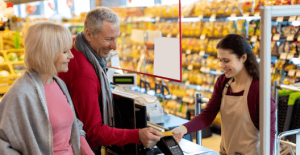The year is ending and it’s time for Brazilian retail to take stock: is it possible to celebrate the results?
At the beginning of 2019, with the arrival of a new government that promised to prioritize reforms such as Social Security and Tax, the sector’s prospects were optimistic, but the unstable economic scenario and the delay in approving the proposals had consequences throughout the year, with good and bad times alternating.
The final stretch of the year promises a Christmas with increased consumption. According to the CNC (National Confederation of Commerce of Goods, Services and Tourism), there should be an increase of 5.2% in Christmas sales, with a movement of R$ 36.3 billion, resuming the level reached in 2014, when there was a record. The reasons for optimism include the release of a larger volume of FGTS (Guarantee Fund for Length of Service) resources, controlled inflation and credit facilities.
The expectation confirms other surveys released recently, such as the expressive index recorded by the IBGE (Brazilian Institute of Geography and Statistics) in the Monthly Survey of Commerce released this month, with data for October, which recorded six consecutive months of growth, with a 2.7% increase in restricted retail and 4.2% in extended retail.
Traditional commemorative dates also increased in relation to 2018: 1.7% on Mother’s Day, 1.4% on Valentine’s Day, 0.8% on Father’s Day and 1.7% on Children’s Day.
The national trade calendar gained another date this year. An initiative of the federal government, the Brazil Week, held from September 6 to 15, generated an increase of 18.5% in e-commerce sales compared to the daily average of other recent weeks and a growth of 7.9% in total retail (physical and online). Also recent, Consumer Day guaranteed a 45% increase in sales in virtual stores in March, compared to the previous month.

The 10th edition of the Brazilian Black Friday registered consistent growth in e-commerce revenue. According to the consultancy Ebit Nielsen, it was R$ 3.2 billion, representing a 23.6% increase compared to 2018. For ABComm (Brazilian Association of Electronic Commerce), revenues reached R$ 3.5 billion, with a 20% growth.
The positive numbers influenced the values of the main retailers in the country on the Stock Exchange, with Via Varejo, Magalu, Renner, Lojas Americanas and B2W reaching historical highs. According to XP Investimentos, shares in the sector accumulated a 33% increase in 2019.
Technology
The main players in national retail continued to invest in innovation, making the shopping experience more complete, personalized, digital and based on the concept of omnichannel, aided by the increasingly detailed information obtained from Big Data and Artificial Intelligence (AI).
One of the main technological innovations was the launch of the Portuguese version of Alexa, Amazon’s virtual voice assistant. The versions of the line have wifi and Bluetooth connection; are capable of playing music from apps like Spotify, Amazon Music, and Deezer; activate iFood or Uber; check bank statements; follow news and consult traffic.

The AI also ensures that the assistant enhances suggestions as it stores information about the user’s preferences. The launch, combined with similar tools offered by Apple and Google, among other companies, brings new possibilities to the purchase journey, making the idea of purchasing products by voice commands a reality.
If abroad automated stores such as Amazon Go, Walmart’s Intelligent Retail Lab and Alibaba’s futuristic supermarket are booming, Zaitt opened another autonomous store in Itaim Bibi, in São Paulo, after a pilot project in Vitória (ES). The project is a partnership with Carrefour, responsible for logistical support and supply.
Shopping in a store without employees is practical, but imagine receiving deliveries directly from robots. iFood announced that, starting in 2020, it will use autonomous vehicles in the food delivery process.
The news does not stop. What else will retail have in store for us next year?
About SoluCX
SoluCX is a startup from São José dos Campos (SP) that offers solutions for consumer experience management. With SoluCX’s software and methodology, companies of all sizes have access to fundamental information to understand customer behavior and their relationship with the brand, which allows them to outline strategies to generate better financial results from loyalty and improvement of services and processes.
SoluCX believes that, through customer satisfaction, companies can create a closer and more lasting relationship with the community of each of their units. Currently, SoluCX evaluates around 500 thousand purchases per month, made in about 5,600 stores of more than 30 customers, such as Magazine Luiza, Spa das Sobrancelhas, Sorridents, Swift, Drogaria São Paulo, Drogarias Pacheco, Telhanorte, Petz and Cobasi, among others.










